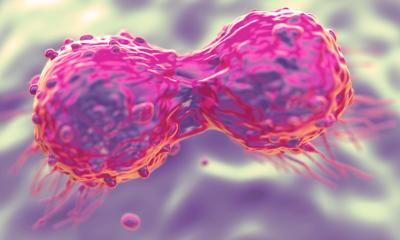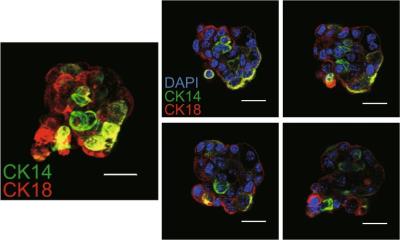News • HER2 breast cancer
‘Soft’ chemotherapy plus targeted treatment spell new hope for elderly patients
Avoidance of side-effects of chemotherapy is particularly important in the elderly, but finding the balance between reduced toxicity and maximum effectiveness is not always easy.
A trial carried out by the European Organisation for Research and Treatment of Cancer, published in The Lancet Oncology, shows that, in older patients with HER2 positive metastatic breast cancer (an aggressive breast cancer subtype where the cancer has spread to other parts of the body), a combination of a ‘soft’ chemotherapy with antiHER2 therapy is highly active and has low toxicity, important in a frail population. Professor Hans Wildiers, a medical oncologist from the University Hospital Leuven, Belgium, and colleagues from Italy, the UK, Portugal, and France, randomised 80 patients to the targeted therapies trastumuzab and pertuzumab (TP) or to TP plus metronomic oral cyclophosphamide (TPM). The patients were aged 70 plus, or, if they were non-fit in other respects than their cancer, 60 plus. The median age of participants was 76.7 years.
"We know that the chemotherapy agent docetaxel combined with TP is effective in younger patients with HER2 positive metastatic breast cancer, but docetaxel is ‘classical’ chemotherapy that can be significantly toxic and thus affect quality of life (QoL) especially in older women. Of course, QoL is important for all patients, but it has special significance in the elderly, particularly when used for palliation,” Prof Wilders says. “We therefore decided to study whether combining TP with the ‘softer’ chemotherapy metronomic oral cyclophosphamide, would be active and have less toxicity than when used with docetaxel, or whether we could even omit chemotherapy and only administer TP in this age group. If tumour progression occurred after TPM or TP, patients would be eligible to receive another targeted drug, T-DM1, which is also generally well tolerated.”
The researchers found that the TPM regime gave seven months longer progression free survival – the length of time during which a patient lives with the disease without it getting worse – compared with TP alone (median progression free survival 13 months versus six months). T-DM1 was also active, with a median disease control period of six months, after TPM or TP. Toxicity for all regimens was very acceptable in this frail population, they say. Nine out of the 29 deaths during the study period were not breast cancer-related. "These results were encouraging," says Prof Wildiers, "since we found that, with gentle therapy, we could delay tumour growth in a significant proportion of frail patients for long periods. Our study also indicates that TPM and T-DM1 allow us to delay, or even avoid entirely, more toxic chemotherapy like docetaxel in these patients. In this age group, maintenance of QoL and the avoidance of toxic side-effects may be just as important as survival."
We cannot and must not assume that because a drug is effective and relatively free of side effects in young to middle-aged adults that it will be the same for the elderly
Denis Lacombe
"We believe that there is a strong case for carrying out trials designed specifically for older people. However, financial support for such trials is very difficult to find. Additionally, older patients are far less likely to receive standard chemotherapy, and are also unlikely to be included in a randomised trial where there is a risk that they will receive a treatment with high toxicity.”
Pharmaceutical companies are reluctant to support trials involving the elderly for a number of reasons, the researchers say. There is little direct benefit for companies, and unexpected toxicity may present new molecules in a bad light. Additionally, it is important to include frailty measurement in future trials; most trials include some elderly but only those who are fit. New drugs should also be evaluated in frail older persons, who represent a large proportion of the real-life population, they say.
Dr Denis Lacombe, EORTC Director General, said: “These impressive results underline how important it is to investigate drug efficacy and tolerance in older patients. Older people, particularly those who are frail, are a special case in exactly the same way as children are. We cannot and must not assume that because a drug is effective and relatively free of side effects in young to middle-aged adults that it will be the same for the elderly. “Given that cancer tends to be a disease of old age, it is irresponsible to overlook special needs in this field. We hope that regulators will listen to our views and put in place measures designed to encourage industry to carry out trials that include the older and frail patients who make up a large proportion of those affected by cancer. Only this way will they get medicines that are not just effective against tumours, but that also meet the requirement of providing a good quality of life.”
Source: The European Organisation for the Research and Treatment of Cancer (EORTC)
10.02.2018





